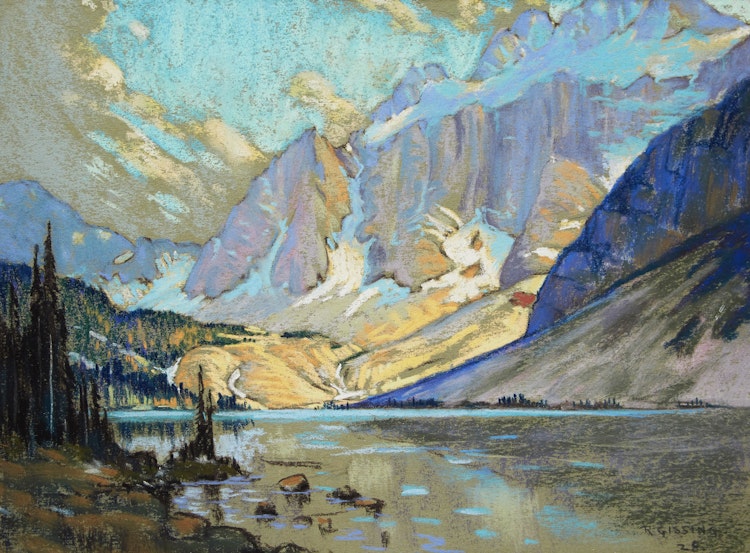Untitled (Western Lake Study) by Roland Gissing

Roland Gissing
Untitled (Western Lake Study)
pastel on paper, mounted to card
signed and dated 1928 lower right
11 x 15 ins ( 27.9 x 38.1 cms )
Auction Estimate: $1,000.00 - $1,500.00
Price Realized $1,180.00
Sale date: May 12th 2020
Private Collection, Toronto
Share this item with your friends
Roland Gissing
(1895 - 1967)
Born in England, Gissing became a painter of Canadian mountains and foothills. He was the son of an author and studied at George Watson's College in Edinburgh, Scotland. His love of American cowboy movies influenced his move to Canada in 1913, and for ten years he worked as a ranch hand in Alberta, Montana, Nebraska, and Arizona. He made sketches of ranch scenes but he made no attempt to paint until later. He returned to Calgary to try his luck at the Calgary Stampede and finally settled at the junction of the Ghost and Bow Rivers near Cochrane.
His sketches were seen by a Captain Mortimer, a cousin of the Duke of Richmond who purchased a number of them and urged him to follow up formal art training. Another guest at Mortimer’s ranch, C.W. Jefferys, prominent Canadian artist after studying his sketches advised him to continue painting as he had been doing. Gissing took Jeffery’s advice and in 1929 he had his first solo show at Jack Booth’s gallery in Calgary, which was highly successful although he had had little formal instruction. The market crash came along that same year but Gissing stayed on in Calgary where he decorated the Hudson’s Bay cafeteria and the Club Cafe. By 1931 however he returned to Cochrane where he married and continued to paint for a living.
In the March of 1944 Gissing’s home and studio, full of his paintings and books, burned to the ground. Deeply discouraged but not beaten, Gissing went to work and rebuilt a new home and studio. His paintings continued to sell and it was not long before he was on his feet. His early painting was influenced by the work of Leonard Richmond and A.C. Leighton but he developed his own distinctive colourful style. William Colgate in 1943 noted the following of his paintings, “. . . his recent pictures are clear and soft in their tones and lit by a calm, subdued radiance.”
Most of his paintings have been done in oils but from 1944 to 1946 he did many watercolours. Many of his scenes are of mountains and rivers inter with golden sunlight. He has gone into the mountains by car, packhorse, or by foot where he remained for weeks at a time, sketching his subjects on 12 x 16” canvases.
He became an associate member of the Alberta Society of Artists when it was first formed in 1930 and full member in 1947. His paintings are in the collections of Queen Elizabeth II and the Duke of Edinburgh, the Edmonton Museum of Art, University of Alberta and the Vancouver Art Gallery. Publishers and lithographers continually sought Gissing’s work for reproduction on calendars, Christmas cards and book illustrations.
Source: "A Dictionary of Canadian Artists, Volume II”, compiled by Colin S. MacDonald, Canadian Paperbacks Publishing Ltd, Ottawa, 1979

